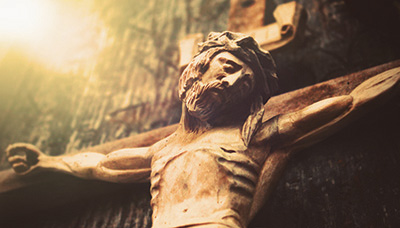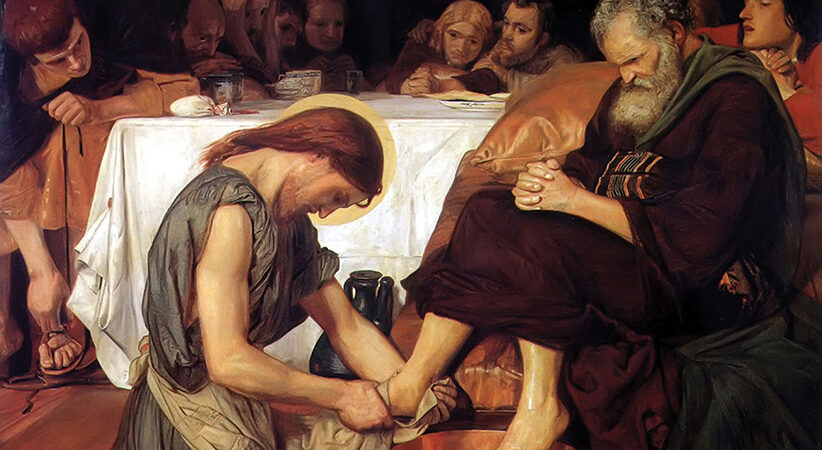The Lenten Exodus into the Paschal Mystery
How deacons display diakonia in this holy time of the year
Dr. Roland Millare Comments Off on The Lenten Exodus into the Paschal Mystery
Jesus describes how self-denial is essential for discipleship: “If anyone wishes to come after me, he must deny himself and take up his cross daily and follow me. For whoever wishes to save his life will lose it, but whoever loses his life for my sake will save it” (Lk 9:23-24). Every Christian must walk the Way of the Cross every day.
Deacons have been blessed in a particular way to make the love of Christ the Servant visible to the world through their diakonia. The preeminent model of diakonia is demonstrated by Christ the deacon washing the feet of his apostles as he enters into the hour of his passion. The 19th-century artist Ford Madox Brown captures the beauty of Christ’s self-giving love and humility as he washes the feet of St. Peter. Our Lord is focused, compassionate and concerned about the needs of the other. These are essential characteristics of true diakonia.
The self-emptying of Christ reaches its climax on the cross when the words of institution are reechoed from the selfless love of the Lord on Calvary: “This is my body, which will be given for you” (Lk 22:19). Beyond the darkness of the Cross awaits the glorious and joyful light of the Resurrection on the third day. Deacons are called to draw upon the Paschal Mystery to delve deeper into the meaning of diakonia. The liturgical year enables deacons to draw upon the various stages within the mystery of Christ’s life to nourish their diakonia.
The mysteries of Christ’s life are intended to become our own. Blessed Columba Marmion in his work maintains, “Not only has Jesus lived [the mysteries] for us, not only are they models for us but, as well as this, in his mysteries Christ is but one with us.”
Through the gift of grace, we are what Christ is by nature. This gift of divine adoption or filiation, which was bestowed upon us via baptism, is celebrated each year as we prepare during the season of Lent for the feast of feasts — Easter.
Entering the Paschal Mystery
The Paschal Mystery is a unique event that transcends history. According to the Catechism of the Catholic Church: “The Paschal mystery of Christ, by contrast, cannot remain only in the past, because by his death he destroyed death, and all that Christ is — all that he did and suffered for all men — participates in the divine eternity, and so transcends all times while being made present in them all. The event of the Cross and Resurrection abides and draws everything toward life” (No. 1085).
The celebration of the sacred liturgy and the liturgical year makes the life of Christ ever-present for the Church. The season of Lent can be an opportunity for deacons to prepare for a reflection on the gift of diakonia in relation to the Paschal Mystery.

Lent begins with Ash Wednesday wherein the priest blesses the ashes and prays that as the faithful “follow the Lenten observances, they may be worthy to come with minds made pure to celebrate the Paschal Mystery.” The deacon should model the path along the purifying Exodus of Lent through prayer, fasting and works of charity.
Deacons often lead the Stations of the Cross on Fridays, so maybe they can find another day or days to practice this devotion privately or with their families during Lent. Deacons can participate with parishioners in Bible studies focused on the Paschal Mystery. Perhaps deacons could lead a group of men in an Exodus 90 group, which focuses on intentional daily prayer, Scripture reading, sacrifices (lots of them) and fellowship. Deacons can also make a concerted effort to invite more of the faithful into the various forms of diakonia they are engaged with during the Lenten season: ministry to the sick/homebound, prison ministry, catechesis, service to the poor and so forth.
………………………………………………………………………………………………………………………………………………………..
The Paschal Mystery
“In the liturgy of the Church, it is principally his own Paschal mystery that Christ signifies and makes present. During his earthly life Jesus announced his Paschal mystery by his teaching and anticipated it by his actions. When his Hour comes, he lives out the unique event of history which does not pass away: Jesus dies, is buried, rises from the dead, and is seated at the right hand of the Father ‘once for all.’ His Paschal mystery is a real event that occurred in our history, but it is unique: all other historical events happen once, and then they pass away, swallowed up in the past.” — Catechism of the Catholic Church, No. 1085
…………………………………………………………………………………………………………………………………………………………
Scriptural readings used in the liturgy during Lent are a preparation for the Christian people to celebrate the Paschal Mystery. Deacons should use the season of Lent as an opportunity to preach on various aspects of the Paschal Mystery and the sacraments. In particular, the deacon could preach on baptism, confession and the holy Eucharist as sacraments that help us live out the Paschal Mystery in our own journeys.
As deacons draw upon the mystery of the Paschal love of Jesus Christ in their preaching and catechesis, they can reflect upon how their ministry of diakonia reflects the selfless love of Christ the Servant. The discipline of Lent is also an opportunity for the deacon to seek the graces available through confession to work on vices that prevent the flourishing of true freedom and virtue.
Spiritual Exodus
Lent is an invitation for all the Church to go on the spiritual Exodus that passes over from slavery to sin to freedom in the moral life in Christ. Lent begins with a stark reminder of our mortality: “Remember that you are dust, and to dust you shall return.” The brevity of life should compel us to repent and “believe in the Gospel.” Deacons who want to be effective in their ministry to the People of God must accompany the faithful in this journey toward deeper freedom and authentic joy.
On Palm Sunday, the beginning of Holy Week, the priest exhorts the faithful with these words before he blesses the palms: “Today we gather to herald with the whole Church the beginning of our Lord’s Paschal Mystery, that is to say, of his passion and resurrection.”
Triduum
The Paschal Mystery is constantly the end put before us at the beginning of Lent and toward its end during Holy Week. As we enter into Triduum, before Christ enters into his full role as high priest offering us the sacrifice of his body in the Eucharist and upon the cross, Jesus demonstrates for deacons how to engage in diakonia.
Jesus is clear about the importance of diakonia: “I am among you as one who serves” (Lk 22:27). After Jesus washes the feet of his disciples he exhorts them with these words: “I have given you a model to follow, so that as I have done for you, you should also do” (Jn 13:15). Jesus lives a life of diakonia for all people. He is the exemplar of diakonia for all people. Deacons must now become visible signs of diakonia in the present. Lent is an opportunity for deacons to renew their diaconal ministry by entering more deeply into the mystery of Christ the deacon.
Singing of the Exsultet
Within the celebration of the liturgy, the climax for the role of the deacon is the singing of the Exsultet at the Easter Vigil. The deacon summons the hosts of heaven, the angels, and the entire world to exult and be glad in light of the good news of the Resurrection. During the Exsultet, the deacon rejoices in Christ’s triumph over sin and death: “O happy fault / that earned so great, so glorious a Redeemer! / O truly blessed night, / worthy alone to know the time and hour / when Christ rose from the underworld!”
Easter is the joyful hope that awaits us, who have lived in darkness in this valley of tears. Deacons can remind the world of the reason for our hope by entering more deeply into mysteries of the Paschal Mystery through their own diakonia.
DR. ROLAND MILLARE serves as vice president of curriculum and the program director of Shepherd’s Heart, an initiative of the St. John Paul II Foundation of Houston, Texas, which offers ongoing formation for deacons, deacon candidates, seminarians and priests on the Gospel of the Family and the Gospel of Life.
………………………………………………………………………………………………………………………………………………………….
Significance of 40
The number 40 is significant in both the Old and New Testaments. Jesus fasted in the desert for 40 days and nights before his temptation. He walked this earth 40 days after his resurrection. In the Old Testament, Noah waited 40 days for the rain to cease. Jonah warns that in 40 days Nineveh will be overthrown.
Generally speaking, according to Catholic Answers, the number 40 is used as a rounded number, “a complete period of time rather than expressions like ‘many’ or ‘some.’”
In addition, “its use denotes a complete period of time that transitions to another period of time. … After each forty days … a great event occurs, or a definitive transition takes place.”
…………………………………………………………………………………………………………………………………………………………





